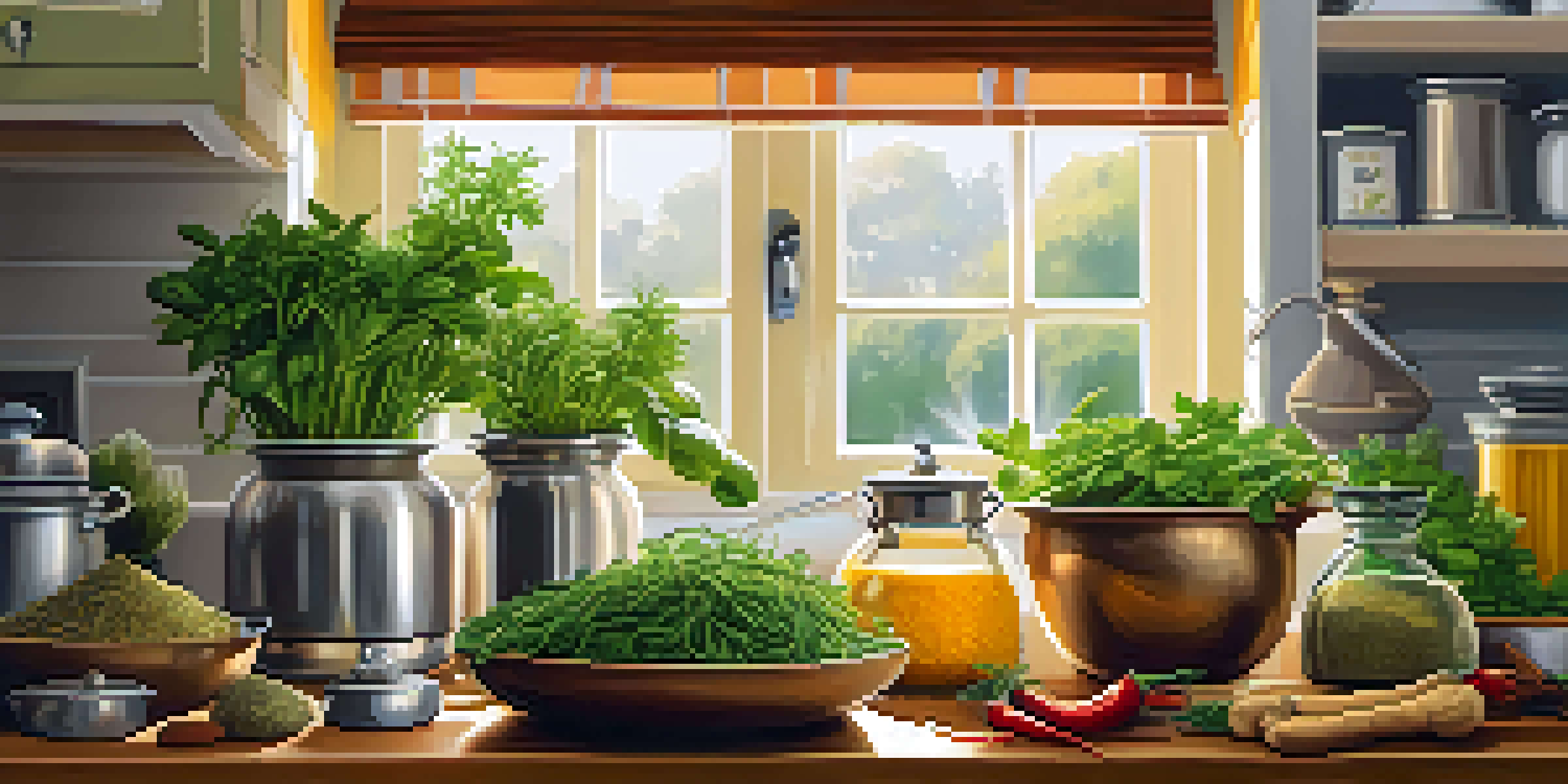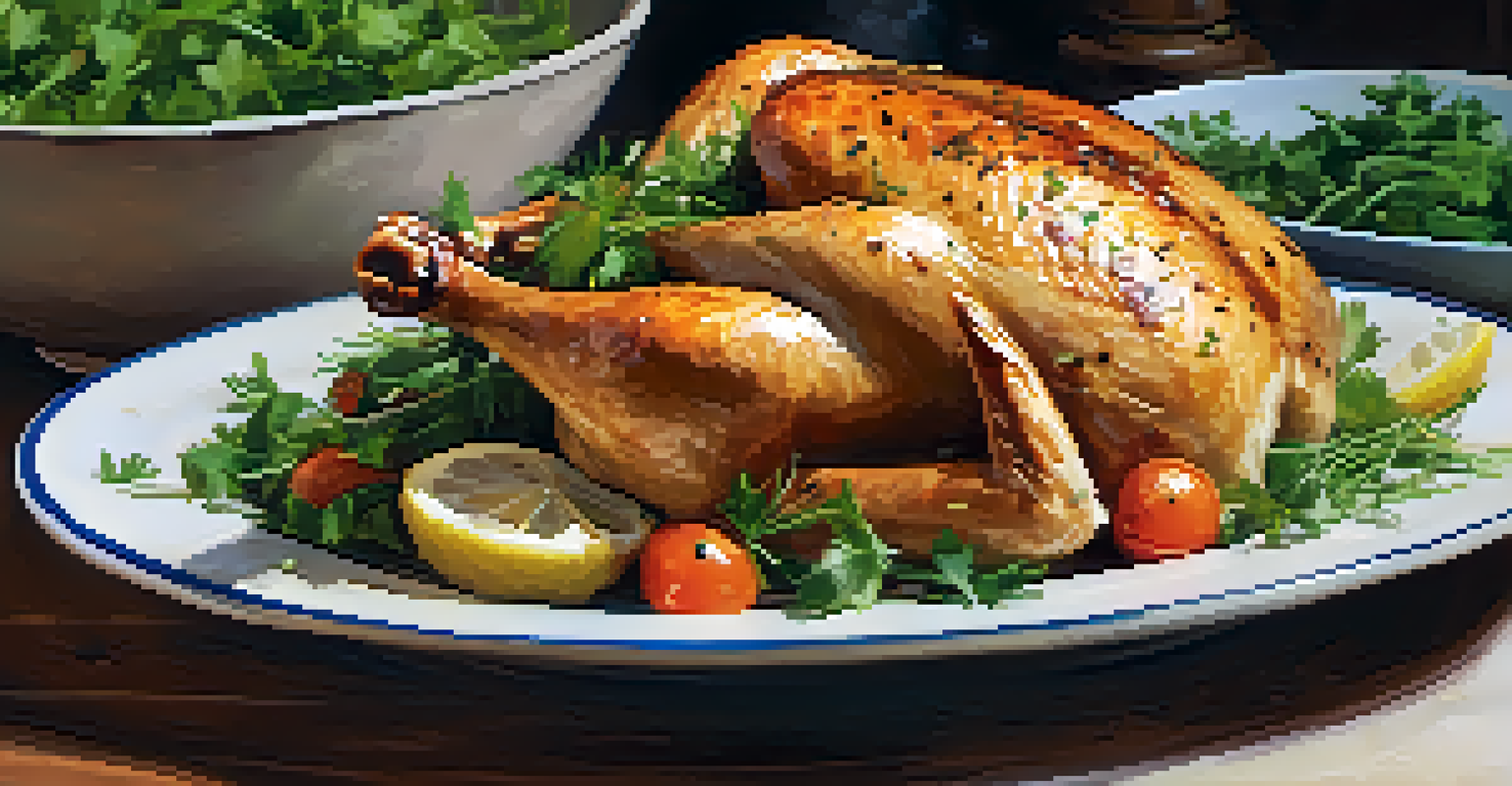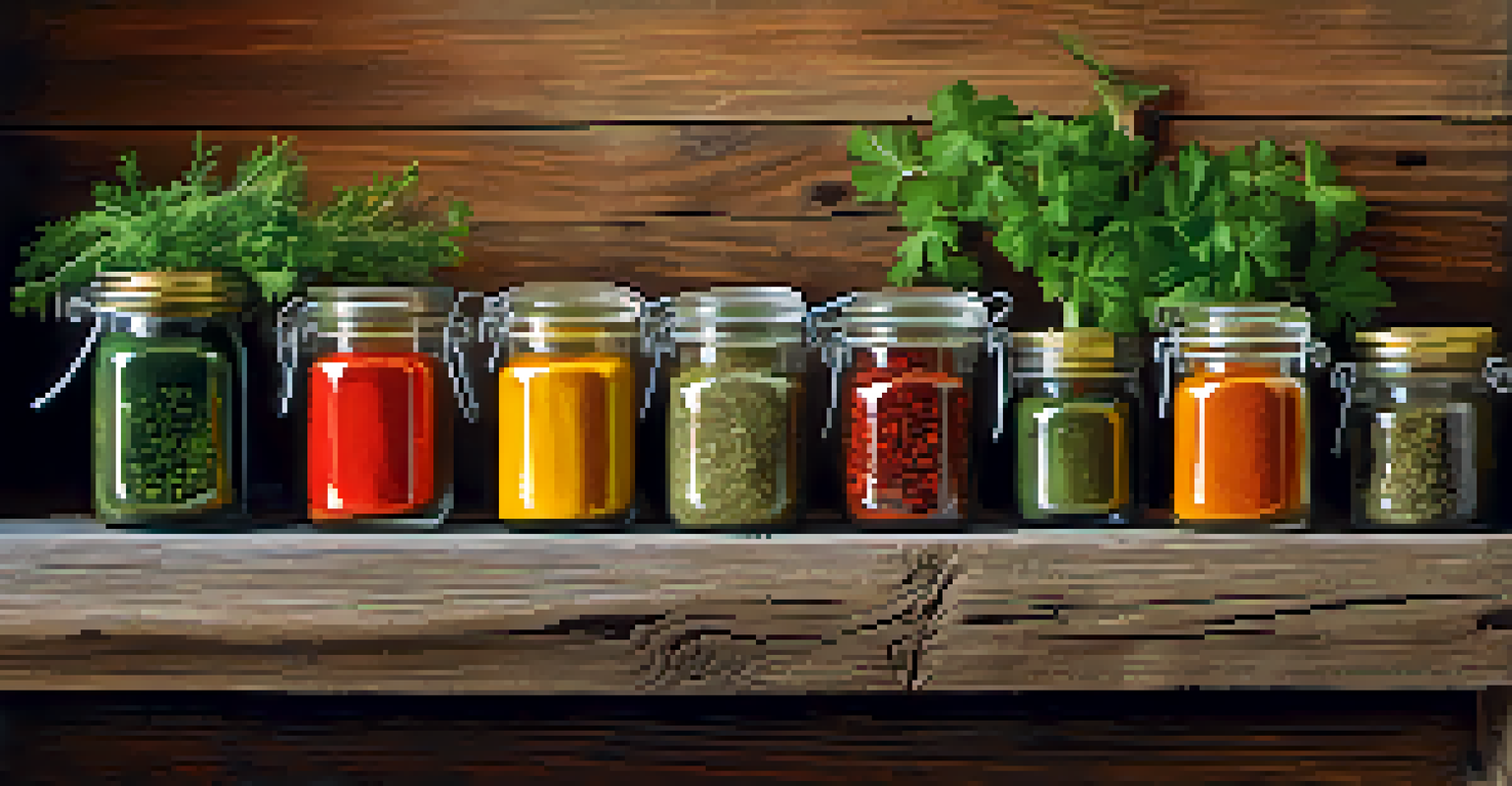The Role of Herbs and Spices in Culinary Medicine

Understanding Culinary Medicine and Its Importance
Culinary medicine is a blend of cooking and nutritional science aimed at promoting health. It focuses on using food as a tool to prevent and treat diseases, making it both an art and a science. In this approach, ingredients play a critical role, especially herbs and spices, which not only add flavor but also health benefits.
Let food be thy medicine and medicine be thy food.
By incorporating herbs and spices into our meals, we can enhance the nutritional profile of our dishes. For instance, turmeric, with its active compound curcumin, has been widely studied for its anti-inflammatory properties. This means that a simple curry can be more than just a delicious dish; it can also contribute to our well-being.
Ultimately, understanding culinary medicine empowers us to make informed choices about what we eat. It emphasizes that every meal can be an opportunity to nourish our bodies and prevent illness, paving the way for a healthier lifestyle.
The Nutritional Power of Herbs and Spices
Herbs and spices are nutrient-dense, meaning they pack a punch in terms of vitamins, minerals, and antioxidants while being low in calories. For instance, parsley is rich in vitamin K, which is essential for bone health, while cinnamon has been linked to improved blood sugar control. This makes them excellent additions to our diets.

Moreover, these ingredients often contain phytochemicals that provide additional health benefits. For example, garlic is known for its immune-boosting properties, while ginger can help with digestion and nausea. By using herbs and spices in everyday cooking, we can naturally enhance our meals and support our health.
Culinary Medicine Promotes Health
Culinary medicine combines cooking and nutritional science to use food as a tool for disease prevention and health promotion.
Incorporating a wide variety of herbs and spices into our diets can also lead to a more diverse nutrient intake. This diversity is crucial for optimal health, as different spices can target different health issues, making our meals not just tasty but also beneficial.
Herbs and Spices as Natural Remedies
Many herbs and spices have been used for centuries as natural remedies in traditional medicine. For example, peppermint is often used to relieve headaches and digestive issues, while chamomile is known for its soothing properties. This rich history underscores their potential as effective, natural alternatives to over-the-counter medications.
Herbs are the great healers of the world. They are nature's gift to restore balance and promote health.
Using these ingredients in our cooking can serve as a preventive measure against various ailments. A warm cup of ginger tea can alleviate cold symptoms, while turmeric lattes can provide anti-inflammatory benefits. These simple additions to our diet can empower us to take control of our health.
However, it’s important to remember that while herbs and spices can support health, they should complement, not replace, conventional treatments prescribed by healthcare professionals. Balancing culinary medicine with medical advice creates a holistic approach to wellness.
Popular Herbs and Spices and Their Benefits
Some herbs and spices stand out for their unique health benefits. For instance, basil is not only a fragrant addition to dishes but also offers anti-inflammatory and antibacterial properties. Similarly, rosemary is known for its potential to enhance memory and concentration.
Each herb and spice has its own set of health benefits, making them versatile tools in the kitchen. Oregano is packed with antioxidants, which help fight free radicals in the body, while cayenne pepper can boost metabolism. The possibilities are endless, allowing us to tailor our meals to our health needs.
Herbs and Spices Boost Nutrition
Herbs and spices enhance meals with vitamins, minerals, and antioxidants, making them essential for a nutrient-rich diet.
Exploring these options can be an enjoyable culinary adventure. Trying new recipes that highlight different herbs and spices can add excitement to our meals while also promoting better health.
Incorporating Herbs and Spices Into Daily Cooking
Integrating herbs and spices into our daily cooking doesn’t have to be complicated. Simple practices, like adding fresh herbs to salads or using spices in marinades, can elevate flavors and health benefits without a lot of effort. A sprinkle of herbs can transform a mundane dish into something extraordinary.
Experimenting with different combinations can also lead to delicious discoveries. For example, mixing garlic, lemon, and thyme can create a delightful seasoning for roasted chicken. The goal is to become comfortable with these ingredients and find what works best for your palate and health goals.
Over time, making herbs and spices a staple in your kitchen will become second nature. With a little creativity, each meal can be an opportunity to explore flavors while nourishing your body.
The Science Behind Herbs and Spices
There’s a growing body of research that supports the health benefits of various herbs and spices. Scientists are studying the bioactive compounds found in these ingredients to understand how they affect our bodies. This scientific backing helps us appreciate their role beyond just flavoring our food.
For instance, studies have shown that curcumin in turmeric can reduce inflammation and may even improve brain function. Similarly, research on the benefits of garlic suggests it can lower blood pressure and cholesterol levels. Understanding these effects adds credibility to culinary medicine and encourages us to use these ingredients more intentionally.
Natural Remedies in Everyday Cooking
Many herbs and spices serve as natural remedies, empowering individuals to support their health through everyday cooking.
As we learn more about the science behind herbs and spices, we can make better choices in our cooking. This knowledge empowers us to create meals that are not just delicious but also beneficial for our health.
The Future of Culinary Medicine and Herbs
As the concept of culinary medicine gains popularity, the future looks promising for the role of herbs and spices in our diets. More chefs and nutritionists are recognizing their potential and incorporating them into health-focused recipes. This shift highlights a growing awareness of the connection between food and health.
Furthermore, as more people seek natural remedies and holistic approaches to health, the demand for knowledge about herbs and spices will continue to rise. Educational opportunities, cooking classes, and workshops focused on culinary medicine are becoming more common, helping people understand how to use these ingredients effectively.

Ultimately, the future of culinary medicine is about empowering individuals to make informed choices about their food. By embracing herbs and spices, we can create a healthier society, one meal at a time.